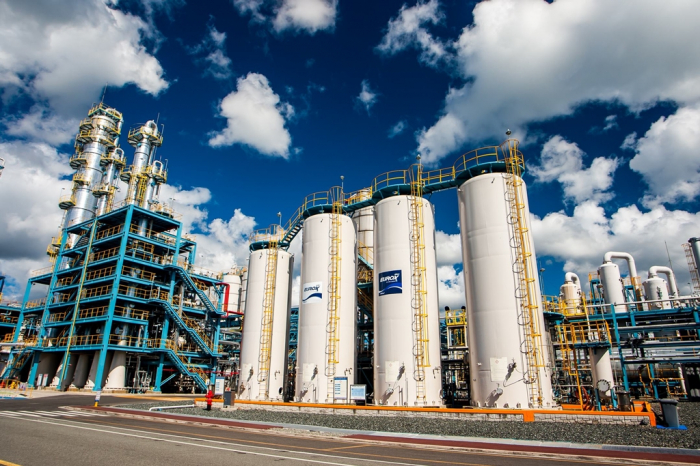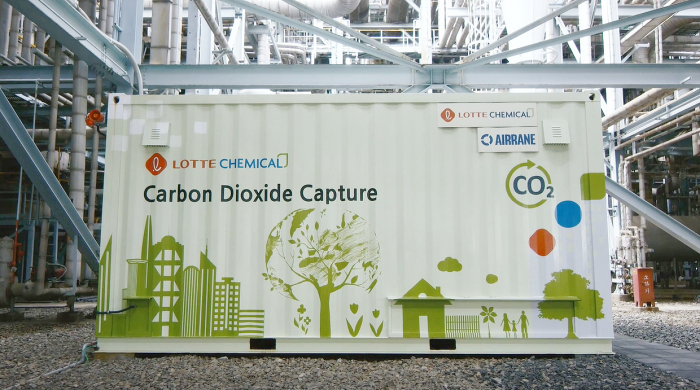Petrochemicals
Lotte Fine Chemical transforms from ugly duckling to golden swan
Just six years after it became a Lotte Group affiliate, the fine chemicals firm has emerged as the conglomerate’s cash cow
By Feb 13, 2023 (Gmt+09:00)
2
Min read
Most Read
LG Chem to sell water filter business to Glenwood PE for $692 million


Kyobo Life poised to buy Japan’s SBI Group-owned savings bank


KT&G eyes overseas M&A after rejecting activist fund's offer


StockX in merger talks with Naver’s online reseller Kream


Mirae Asset to be named Korea Post’s core real estate fund operator



For Samsung Group, the fine chemicals business was an ugly duckling losing money while other affiliates, including Samsung Electronics Co., were flush with cash, riding the tech boom in the early 2000s.
Started as a fertilizer maker by Samsung founder Lee Byung-chull in 1964, Samsung Fine Chemicals Co., sidelined by other Samsung companies, stopped producing fertilizer years later.
In 2016, Samsung decided to hand over the company together with other chemical businesses, including Samsung BP Chemicals and Samsung SDI Co.'s chemical unit, to its rival Lotte Group.
Six years later, however, the company, renamed Lotte Fine Chemical Co., has turned into a swan laying golden eggs.
Lotte Fine Chemical, now a subsidiary of Lotte Chemical Corp., is South Korea’s largest producer of ammonia, a raw material for fertilizer.
Lotte Fine’s regulatory filing showed its 2022 sales grew 38.4% over the previous year to 2.46 trillion won ($1.93 billion). Its operating profit climbed 67.1% to a record 408.5 billion won, an all-time high figure, for the second consecutive year.
Last year’s operating profit also represents the largest profit among 89 Lotte Group affiliates, even higher than the conglomerate’s flagship Lotte Shopping Co., which reported profit of 394.2 billion won in 2022.
Lotte Fine’s parent, Lotte Chemical, posted a loss of 758.4 billion won last year.
The fine chemical company then expanded its ammonia and chlorine lines, raw materials for paints and bleaches.

The company said last year’s record earnings were buoyed by a hike in ammonia prices and a dire shortage of urea, a chemical compound used to reduce diesel engine pollution. The urea shortage created a nationwide crisis, forcing the government as well as other Korean firms to urgently seek out alternatives when China banned its urea exports.
CASH COW FOR GROUP AFFILIATES
Alongside its decent performance, Lotte Fine Chemical’s financial structure has also improved, with its debt-equity ratio standing at a mere 17.9%.
Sitting on 589 billion won in cash and cash equivalents, the company last month lent 300 billion won to Lotte Engineering & Construction Co., which was on the brink of a liquidity crisis after failed project finance.
Lotte Fine Chemical’s enterprise value is also rising with a tailwind from its affiliate Lotte Ineos Chemical Co., in which it holds a 49.06% stake. The fine chemical company is expected to receive decent dividends from Lotte Ineos, which posted a record operating profit of between 300 billion won and 400 billion won last year.
In tandem with its parent, Lotte Fine is leading the group’s new-growth businesses.
Lotte Chemical is pushing for a 6 trillion won project to import 1.2 million tons of ammonia, converted from green hydrogen and produced through green energy sources such as wind and solar power at overseas facilities.
For its part, Lotte Fine Chemical is developing the technology to extract hydrogen from ammonia for industrial use.
Write to Ik-Hwan Kim at lovepen@hankyung.com
In-Soo Nam edited this article.
More to Read
-
 Hydrogen economyLotte Chemical, RWE, Mitsubishi form alliance for clean ammonia
Hydrogen economyLotte Chemical, RWE, Mitsubishi form alliance for clean ammoniaFeb 08, 2023 (Gmt+09:00)
1 Min read -
 PetrochemicalsLotte Chemical raises stake in Fine Chemical amid merger talk
PetrochemicalsLotte Chemical raises stake in Fine Chemical amid merger talkMay 15, 2022 (Gmt+09:00)
1 Min read -
 BatteriesLotte Chemical, Soelect in $200 million JV for advanced batteries
BatteriesLotte Chemical, Soelect in $200 million JV for advanced batteriesApr 26, 2022 (Gmt+09:00)
1 Min read -
 BatteriesLotte Chemical to invest $502 mn in eco-friendly materials plants in Korea
BatteriesLotte Chemical to invest $502 mn in eco-friendly materials plants in KoreaFeb 07, 2022 (Gmt+09:00)
2 Min read -
 Hydrogen economyLotte Chemical goes green with $3.8 bn investment in hydrogen business
Hydrogen economyLotte Chemical goes green with $3.8 bn investment in hydrogen businessJul 13, 2021 (Gmt+09:00)
2 Min read
Comment 0
LOG IN


